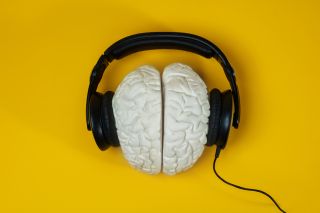Memory
Why That Song Is Stuck in Your Head
Understanding the phenomenon of "earworms."
Posted February 6, 2024 Reviewed by Michelle Quirk
Key points
- We tend to remember best what is emotional, distinctive, and personally important to us.
- Memory can be more accurate when music is present.
- People who experience earworms to be unpleasant can become distracted, anxious, or distressed by them.
Researched and drafted by Faith Hochgesang, under the guidance of Dr. Elizabeth Kensinger, with additional editing by Drs. Daley and Ford
When was the last time you went a whole day without hearing music? Even if I didn’t make the intentional choice to start off my day with my earbuds playing the guitar riffs of Zeppelin, or the serenades of Sinatra, I would probably still unintentionally encounter some other form of musical input—in the elevator, or coming from another’s room as I leave my building. Oftentimes, even after the actual music has stopped, I can still hear a few lines of the last song I was listening to repeating again and again in my brain. I can go a whole day, sometimes even multiple days, with my mind coming back to the same 20 seconds of a memorable song.

Why do songs get stuck in our heads?
People’s minds have been lingering on the song of the summer well into winter long before we had access to music on our personal devices. In 1979, psychiatrist Cornelius Eckert coined a much-used moniker for those often frustrating brief musical fixations, which he called “earworms,” meaning “musical itches” from German language roots.
Generally, we tend to remember best what is emotional, distinctive, and personally important to us. Our autobiographical memories, or our memories for specific points in the past from the perspective of ourselves, recall emotional and self-relevant events. They rely on the circuitry of the medial temporal lobe, including the amygdala, which ties our emotions to a certain event. When I listened to Frank Sinatra on my morning walk, my joy in hearing a song that reminded me so much of my family and home was attached to the recollection of my walking to class.
Why am I talking so much about emotion if this post is about music and how to get “let me play among the stars” out of everyone’s heads? According to a study by Lutz Jäncke, “hearing music is closely associated with strong emotional feelings.” Because music is so emotionally provocative for us, hearing music would also be more memorable to us than some of our other day-to-day tasks. But we don’t typically recall whole songs. Instead, brain scientist David Silbersweig noted that this phenomenon, known scientifically as involuntary musical imagery, is “a looped segment of music that’s usually about 20 seconds long and automatically comes into your awareness and keeps playing on repeat” (Walsh, 2021).
There are features common to many earworms:
- Songs that evoke emotion for us
- Overly repetitive music or songs, including songs with long durations of the same notes or smaller intervals. Professor James Kellaris adds that music with “general patterns” of simplicity and “some mild incongruity” make certain tunes structurally advantageous for earworms
- Songs we listen to repeatedly

Why should we consider letting an earworm play on in our brains?
For the majority of us who don’t find earworms particularly annoying, Dr. Partha Nandi suggests we allow earworms to continue in our brains to improve our memories. Dr. Nandi noted that memory can be more accurate when music is present. In this research, participants were shown images while listening to a musical piece and later asked to recall what they had seen. Images were more accurately recalled when the musical piece was playing versus when the musical piece was not playing. Based on other research (Blood et al., 1999), Dr. Nandi attributes this to the strengthening of music memories in the auditory cortex, the region of the brain that houses sound processing, and along with it, earworms.
However, those who do find earworms to be aggravating may not experience memory enhancement in the same way. The third of people who experience earworms to be unpleasant can become distracted, anxious, or distressed by their earworms (Brown, Jilka, and Williamson). Earworms that stay on repeat for more than 24 hours can also indicate something more troublesome happening in the brain and may require a call to your doctor (Pillay, 2017)

Why do we get earworms at all?
Up to 40 percent of our everyday thoughts can be categorized as spontaneous cognitions (McVay et al., 2009). Earworms fall into this category, as a form of mind wandering coming from involuntary autobiographical memories (McSpadden & Smallwood, 2008; Bernsten, 2010). Earworms can also be brought to mind, or kept, voluntarily to enhance our memories when in relation to musical or emotional events, although they are predominantly involuntary.
What are some of the most universal earworms?
In 2016, the American Psychological Association published a study reporting that “Bohemian Rhapsody” by Queen, “Don’t Stop Believing” by Journey, “Bad Romance” by Lady Gaga, “Moves Like Jagger” by Maroon 5, and “Somebody That I Used to Know” by Gotye were current universal earworms among a sample population of 3,000. According to music theory, all of these songs share commonalities in terms of fast tempos at some point, popular melodic shapes, and unusual intervals (Jakubowski et al., 2017). The last criterion speaks to their originality from current pop songs and also fits the distinctive quality often found in memories remembered best. Thereby, the most universal earworms follow the predictable psychology of being emotionally musical, distinctively melodic, and lyrically personal to be remembered best by listeners.

Let the Music Play
Tomorrow, I will walk to class again with my earbuds in. But this time, I won’t just let my mind unintentionally wander to the sensation of fallen leaves under my shoes, or to the brisk air on my recently awoken face. Instead, I might try and intentionally and voluntarily activate an earworm to one of my favorite Zeppelin or Sinatra songs to improve my memory.
On the way up to class in the elevator, I might analyze why the genre of elevator music is even a recognizable category. Without lyrics, this genre must more heavily rely on melodic repetition and emotionally charged, distinctive jazz intervals. Walking out of my building, I might actually pay attention to the music coming from speakers in various dorm rooms. Do these songs have fast tempos? Perhaps many of their notes are the same. Like most of us, at the end of my life, I will probably be able to count on my hands the number of days I go without music entirely. Now, I’m more excited than ever that the music won’t always stop when I choose to turn it off. Instead, I’ll smile when my brain begins to loop the same refrain. I’ll still be able to “see what spring is like” in the dead of winter thanks to Sinatra and the musical imagery of my brain. Music not only makes us feel, but it also makes our memories grow!
References
Colleen Walsh. Why that song is stuck in your head. The Harvard Gazette. December 14, 2021.
Chau Tu. Why Do Songs Get Stuck in Our Heads? Science Friday. May 28, 2014.
Partha Nandi. That Song Stuck In Your Head Is Improving Your Memory. Ask Dr. Nandi.
Srini Pillay. Why you can’t get a song out of your head and what to do about it. Harvard Health Blog. October 4, 2017.




